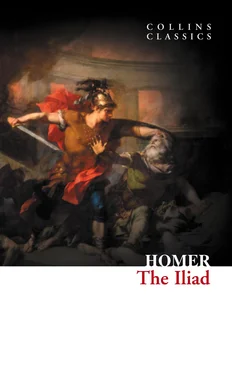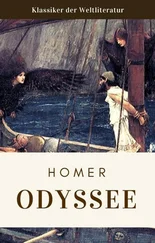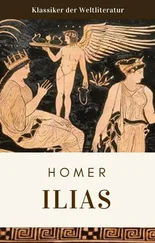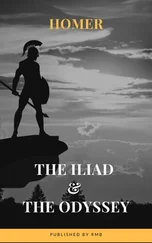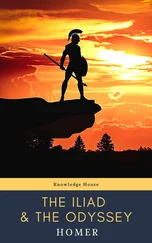Strife and debate thy restless soul employ,
And wars and horrors are thy savage joy,
If thou hast strength, ’twas Heaven that strength bestow’d;
For know, vain man! thy valour is from God.
Haste, launch thy vessels, fly with speed away;
Rule thy own realms with arbitrary sway;
I heed thee not, but prize at equal rate
Thy short-lived friendship, and thy groundless hate.
Go, threat thy earth-born Myrmidons:—but here
’Tis mine to threaten, prince, and thine to fear.
Know, if the god the beauteous dame demand,
My bark shall waft her to her native land;
But then prepare, imperious prince! prepare,
Fierce as thou art, to yield thy captive fair:
Even in thy tent I’ll seize the blooming prize,
Thy loved Briseis with the radiant eyes.
Hence shalt thou prove my might, and curse the hour
Thou stood’st a rival of imperial power;
And hence, to all our hosts it shall be known,
That kings are subject to the gods alone.”
Achilles heard, with grief and rage oppress’d,
His heart swell’d high, and labour’d in his breast;
Distracting thoughts by turns his bosom ruled;
Now fired by wrath, and now by reason cool’d:
That prompts his hand to draw the deadly sword,
Force through the Greeks, and pierce their haughty lord;
This whispers soft his vengeance to control,
And calm the rising tempest of his soul.
Just as in anguish of suspense he stay’d,
While half unsheathed appear’d the glittering blade,
Minerva swift descended from above,
Sent by the sister and the wife of Jove
(For both the princes claim’d her equal care);
Behind she stood, and by the golden hair
Achilles seized; to him alone confess’d;
A sable cloud conceal’d her from the rest.
He sees, and sudden to the goddess cries,
Known by the flames that sparkle from her eyes:
“Descends Minerva, in her guardian care,
A heavenly witness of the wrongs I bear
From Atreus’ son?—Then let those eyes that view
The daring crime, behold the vengeance too.”
“Forbear (the progeny of Jove replies)
To calm thy fury I forsake the skies:
Let great Achilles, to the gods resign’d,
To reason yield the empire o’er his mind.
By awful Juno this command is given;
The king and you are both the care of heaven.
The force of keen reproaches let him feel;
But sheathe, obedient, thy revenging steel.
For I pronounce (and trust a heavenly power)
Thy injured honour has its fated hour,
When the proud monarch shall thy arms implores
And bribe thy friendship with a boundless store.
Then let revenge no longer bear the sway;
Command thy passions, and the gods obey.”
To her Pelides:—“With regardful ear,
’Tis just, O goddess! I thy dictates hear.
Hard as it is, my vengeance I suppress:
Those who revere the gods the gods will bless.”
He said, observant of the blue-eyed maid;
Then in the sheath return’d the shining blade.
The goddess swift to high Olympus flies,
And joins the sacred senate of the skies.
Nor yet the rage his boiling breast forsook,
Which thus redoubling on Atrides broke:
“O monster! mix’d of insolence and fear,
Thou dog in forehead, but in heart a deer!
When wert thou known in ambush’d fights to dare,
Or nobly face the horrid front of war?
’Tis ours, the chance of fighting fields to try;
Thine to look on, and bid the valiant die:
So much ’tis safer through the camp to go,
And rob a subject, than despoil a foe.
Scourge of thy people, violent and base!
Sent in Jove’s anger on a slavish race;
Who, lost to sense of generous freedom past,
Are tamed to wrongs;—or this had been thy last.
Now by this sacred sceptre hear me swear,
Which never more shall leaves or blossoms bear,
Which sever’d from the trunk (as I from thee)
On the bare mountains left its parent tree;
This sceptre, form’d by temper’d steel to prove
An ensign of the delegates of Jove,
From whom the power of laws and justice springs
(Tremendous oath! inviolate to kings);
By this I swear:—when bleeding Greece again
Shall call Achilles, she shall call in vain.
When, flush’d with slaughter, Hector comes to spread
The purpled shore with mountains of the dead,
Then shall thou mourn the affront thy madness gave,
Forced to deplore when impotent to save:
Then rage in bitterness of soul to know
This act has made the bravest Greek thy foe.”
He spoke; and furious hurl’d against the ground
His sceptre starr’d with golden studs around:
Then sternly silent sat. With like disdain
The raging king return’d his frowns again.
To calm their passion with the words of age,
Slow from his seat arose the Pylian sage,
Experienced Nestor, in persuasion skill’d;
Words, sweet as honey, from his lips distill’d:
Two generations now had pass’d away,
Wise by his rules, and happy by his sway;
Two ages o’er his native realm he reign’d,
And now the example of the third remain’d.
All view’d with awe the venerable man;
Who thus with mild benevolence began:—
“What shame, what woe is this to Greece! what joy
To Troy’s proud monarch, and the friends of Troy!
That adverse gods commit to stern debate
The best, the bravest, of the Grecian state.
Young as ye are, this youthful heat restrain,
Nor think your Nestor’s years and wisdom vain.
A godlike race of heroes once I knew,
Such as no more these aged eyes shall view!
Lives there a chief to match Pirithous’ fame,
Dryas the bold, or Ceneus’ deathless name;
Theseus, endued with more than mortal might,
Or Polyphemus, like the gods in fight?
With these of old, to toils of battle bred,
In early youth my hardy days I led;
Fired with the thirst which virtuous envy breeds,
And smit with love of honourable deeds,
Strongest of men, they pierced the mountain boar,
Ranged the wild deserts red with monsters’ gore,
And from their hills the shaggy Centaurs tore:
Yet these with soft persuasive arts I sway’d;
When Nestor spoke, they listen’d and obey’d.
If in my youth, even these esteem’d me wise;
Do you, young warriors, hear my age advise.
Atrides, seize not on the beauteous slave;
That prize the Greeks by common suffrage gave:
Nor thou, Achilles, treat our prince with pride;
Let kings be just, and sovereign power preside.
Thee, the first honours of the war adorn,
Like gods in strength, and of a goddess born;
Him, awful majesty exalts above
The powers of earth, and sceptred sons of Jove.
Let both unite with well-consenting mind,
So shall authority with strength be join’d.
Leave me, O king! to calm Achilles’ rage;
Rule thou thyself, as more advanced in age.
Forbid it, gods! Achilles should be lost,
The pride of Greece, and bulwark of our host.”
This said, he ceased. The king of men replies:
“Thy years are awful, and thy words are wise.
But that imperious, that unconquer’d soul,
No laws can limit, no respect control.
Before his pride must his superiors fall;
His word the law, and he the lord of all?
Him must our hosts, our chiefs, ourself obey?
What king can bear a rival in his sway?
Grant that the gods his matchless force have given;
Has foul reproach a privilege from heaven?”
Here on the monarch’s speech Achilles broke,
And furious, thus, and interrupting spoke:
Читать дальше
